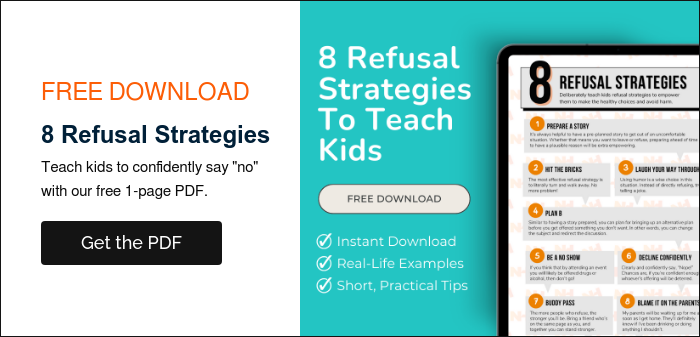Empowering Teens with Refusal Strategies: A Critical Step in Drug Prevention
In today’s world, teens are constantly navigating complex social pressures, including pressure to use drugs and alcohol. While information is important, it’s not enough.
Teens need real-life skills to say “no” with confidence.
That’s where refusal strategies come in. These are practical tools that empower teens to make healthy choices.
At Natural High, we integrate these skills into our free, story-based curriculum to help young people stay true to their values and protect what they love most: their Natural High.
Research from the National Institute on Alcohol Abuse (NIAAA) shows that people who drink before age 15 are 5.6 times more likely to report alcohol use disorder as an adult than those who wait until they are 21 to begin drinking. Read here for statistics on teen drug and alcohol use.
In other words, delaying usage as long as possible is critical.
But, the idea of kids simply saying “no” to peer pressure can be naive to the complex dynamics of acceptance and belonging that every adolescent goes through. That’s why deliberately teaching them refusal strategies can empower them to make the best choices and avoid harm.
Before we discuss teaching kids refusal strategies, let’s first talk about peer pressure.
Understanding Peer Pressure and Its Impact
It’s crucial to recognize the different ways peer pressure can show up – sometimes it’s obvious, like someone handing you a drink, and other times it’s more subtle, like wanting to fit in with a group.
The first step is spotting these pressures and being ready to handle them.
Direct Peer Pressure:
This happens when someone explicitly encourages or pressures a teen to engage in risky behavior, like offering them a drink at a party.
It’s straightforward and involves clear actions or words.
Indirect Peer Pressure:
This is more subtle and comes from observing the behavior of others. It might be the pressure to fit in with a group that engages in certain activities without being directly asked.
Both types can be powerful, and teens need to be prepared to recognize and handle them.
Peer pressure is a powerful influence on teens, often pushing them toward risky behaviors like drug and alcohol use. Understanding how peer pressure works is a critical first step in combating it.
Teens need to know that it’s okay to feel pressured, but they have the power to make their own choices.
Helping Teens Recognize and Respond
Explain to your teen that both forms of peer pressure can be powerful, and they need to be prepared to recognize and handle them. Encourage them to think critically about situations and make choices based on their values, not just the influence of others.
Developing refusal strategies can help them confidently navigate both direct and indirect pressures.
What Are Refusal Skills and Why Do They Matter?
Refusal skills give teens a roadmap for handling peer pressure effectively and respectfully.
Without them, many teens find themselves going along with risky behavior just to avoid feeling awkward or left out.
According to the Botvin LifeSkills Training program, which is one of the most thoroughly researched school-based prevention programs, the core refusal strategies include:
- Say No in a Firm Voice
- Give a Reason or Excuse
- Use the “Broken Record” Technique
- Walk Away
- Avoid the Situation
- Strength in Numbers (Team Up with a Friend)
- Change the Subject
Let’s look at how each of these maps onto the way Natural High helps teens practice and internalize refusal strategies.
Natural High + Refusal Skills: A Perfect Match
1. Say No in a Firm and Confident Voice
Teens need permission and practice to speak up clearly.
– Try: “No thanks, I’m good.” (Maintain eye contact and a confident tone).
Natural High’s influential Storytellers show teens how they stood their ground in tough situations.
Share Pro Dancer Chelsie Hightower’s and Pro Basketball Player Mike Conley’s stories with your kids or students to show them real-life examples of standing strong against peer pressure.
Their experiences show that it’s cool to make your own choices and stick to what you believe in!
Educators can reinforce this by using our discussion guides to role-play real scenarios.
2. Give a Reason or Excuse
Sometimes a simple excuse, like having an early game or needing to be somewhere, can be enough.
When teens identify their passion, their natural high, they naturally develop reasons to say “no”.
“I can’t risk getting hurt or messing up my focus” becomes an authentic excuse that’s rooted in what they care about.
It’s helpful to have a pre-planned story to get out of an uncomfortable situation. Whether that means you want to leave or refuse, preparing ahead of time to have a plausible reason will be extra empowering.
– Try: “I can’t tonight; I have to babysit my little brother. My parents don’t trust anyone else, and I really need the extra cash for the weekend.”
or “I can’t, my parents are waiting up for me. They’ll definitely notice if I’ve been drinking.”
3. Use the Broken Record Technique
Repeatedly saying no shows resolve and reduces the chance of giving in.
Natural High’s lesson plans guide educators to help students practice saying “no” repeatedly in different ways through scripts and class activities. Repetition builds confidence.
4. Walk Away
Sometimes the best option is to remove yourself entirely.
Our videos and journaling prompts help teens think about who they want to surround themselves with and what kind of situations they want to avoid.
Knowing it’s okay to walk away is part of building that internal compass.
– Try: “I’m heading out; this isn’t my scene. Catch you later!” (Exit the situation calmly).
5. Avoid the Situation
Prevention starts before pressure even begins. Choosing not to be at the party, or skipping the hangout, is a skill in itself.
By guiding teens to choose activities aligned with their passions, we help them fill their time with meaningful, safe experiences, making it easier to avoid risky environments altogether.
If they think by attending an event they will likely be offered drugs or alcohol, then they can choose not to go!
– Try: “I was going to come, but I have this huge project due tomorrow, and I can’t afford to mess it up. Maybe next time.”(This way, they decline the invitation in advance and don’t put themself in a situation where they will need to refuse substances on the spot).
6. Strength in Numbers
It’s easier to say no when you’re not alone.
Our curriculum encourages peer connection and positive group norms. When young people identify friends who support their goals, they form a safety net of support: whether it’s a music crew, a team, or an art group.
The more people who refuse, the stronger they’ll feel. Bring a friend who’s on the same page, and together they can stand stronger.
– Try: “We’re all staying sober tonight. Come hang out with us instead!” (Encourage group refusal).
7. Change the Subject
Steering the conversation away from risky behavior is an underused but powerful skill.
They can change the subject and redirect the discussion. Teens can be taught to pivot to talk about their natural high or bring up something positive and unrelated. Our storytelling videos and classroom reflections help build that confidence.
– Try: “Instead of drinking, how about we play a game of basketball or grab something to eat?”
Most kids won’t figure these out on their own, yet they will likely find themselves in harm’s way multiple times throughout adolescence.
That’s why they need you to share these strategies with them so they can be ready to face threats that can ruin their life.
They probably won’t come to you and ask you to teach them these skills, which is why you need to take the initiative with them.
Sure, they might cringe, roll their eyes or beg you to change the subject, but at the end of the day, who cares? Their protection is worth being called a nag.


